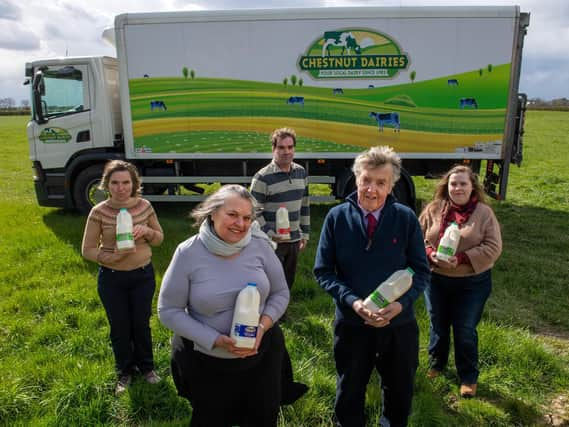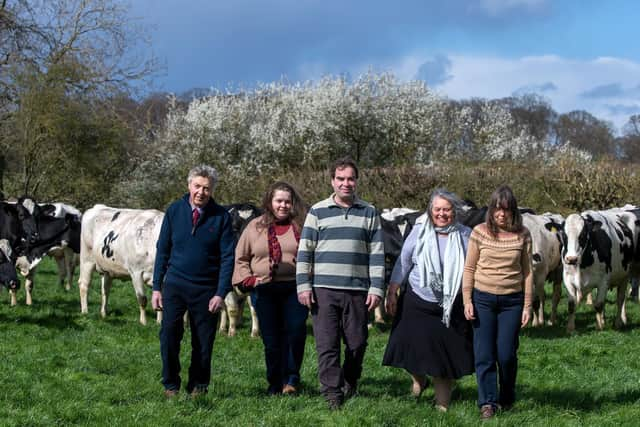Farm of the Week: The Chestnut Dairies owners who know their cows by name and supply milk to local customers


Chestnut Dairies, part of Stud Farm in Seaton, now buys milk from local dairy farms to supply retailers including supermarket chain Sainsburys..
Eric and Sue Varley, who run the farm and business with their three children, said they developed the dairy as an alternative income stream 39 years ago.
Advertisement
Hide AdAdvertisement
Hide Ad“I’ve never known anything else, but we needed to do something additional to milking cows to try and pay off a huge overdraft we had taken on after we split from my parents and that’s how the dairy came about.”


Eric has lived at the 200-acre farm since he was seven years old and his parents moved from Bewholme, near Hornsea, where the family originally had British Friesian cows.
Eric and Sue took over the farm in 1974 and changed the herd to pedigree Holstein Friesian and despite the success of the dairy, Eric said he is still more at home with his cows than anywhere else.
The couple’s three adult children Mathieu, Claire and Danielle, all work either on the farm or in the dairy.
Advertisement
Hide AdAdvertisement
Hide Ad“It has proved successful largely thanks to all the family,” Eric said.
“We have upped our cow numbers from 90 to 120 in the last 18 months and put in a new 12-unit swingover milking parlour last year which has cut down milking time substantially from three hours to just over an hour.”
The longevity of his cows is also a source of pride for Eric, who knows them all by name and said it is still a wrench when they reach the end of their time on the farm.
“We had one old girl, Natalie, go just last week. She was 13 years old. You get to know them all and they each have their own ways.
Advertisement
Hide AdAdvertisement
Hide Ad“Our average number of lactations is around six to seven which is higher than most and we are able to reach that because of the way Mathieu and I care for their welfare. That’s the most important thing of all.”
Eric explained that while cow numbers had been greater many years ago when he used to milk 135 Friesians, the yield was lower.
“Back then the average yield was just 3,000 litres per dairy cow per lactation. It’s now around 10,000 litres and we don’t push them either.
“It is the cow genetics we now have available that has made the difference and it’s a good job too because the price of milk to farmers has not differed that much. More milk per cow was the only way forward.”
Advertisement
Hide AdAdvertisement
Hide AdIn order to maintain a relatively consistent profile of milk production, Stud Farm adopts an all-year round calving pattern with all cows artificially inseminated. But Eric said, there are times when this can fall out a little out of sync.
“At the moment we have probably got slightly too many calving in the spring. Currently 90 of our cows will be put to dairy AI with the other 30 going to Aberdeen Angus. We retain all of the Holstein Friesian females, but all of the bull calves and the Angus bull and heifer calves go to market at three weeks.”
The cows go out to grass in mid-April and are back indoors in October. Eric said one of the major benefits he has seen in his and Mathieu’s time in looking after the herd has been in soil quality across their arable acreage of 70 acres.
Silage produced on the farm from two and sometimes three cuts per year forms the basis of the herd’s diet over winter. Eric said this keeps up the milk quality.
Advertisement
Hide AdAdvertisement
Hide Ad“Grass during the summer and grass silage during the winter is so important for our cows and our milk, but we also understand it is vital to keep the countryside in good shape too.”
Sue said there is a team of around 20 involved in the dairy and the farm, who have “been amazing” during the past 12 months.
“In the first week of lockdown last year our business leaped by 100 per cent,” she said.
“I cannot thank the team enough for their dedication. Our drivers delivered to all the hotspots and we work closely with Heron Foods to try and sell as much as we can locally into independent retailers.
Advertisement
Hide AdAdvertisement
Hide Ad“During the past year people seem to have become more aware of the value of milk and having it available every day.
“Customers have picked up the phone or contacted us by letter or email. We are always very grateful to everyone who buys our milk.”
Chestnut Dairies currently collects milk from 12 other dairy farms, the closest are 16 miles away at Dunswell and Cherry Burton with the furthest 60 miles away from the dairy.
Sue said the mileage is not as important as the commitment from those who sign up.
Advertisement
Hide AdAdvertisement
Hide Ad“We have built a good reputation and we never let anyone down. When Dairy Farmers of Britain went bust a decade ago we took on an additional 22 farms all around the North York Moors.
“We just felt that if we were in the same situation someone would have done the same for us. All we want now is farmers to join us who won’t jump ship.”
Sustainability is also a focus for the dairy and Sue said they have looked at the “whole picture” when it comes to containers for the Chestnut Dairies milk.
“We’ve looked at the whole picture and use recyclable plastic bottles because they are more sustainable as long as customers look after them. They are not biodegradable but the plastic can be recycled.”
Advertisement
Hide AdAdvertisement
Hide AdSue said although dairy farming and running a dairy has always been hard work, she and Eric continue to appreciate their environment.
“Challenges have always been around, but we live for today and we are grateful for what we have and where we live. Seeing the hawthorn hedges blossom once more is wonderful. We know that we are in a very privileged position to be able to spend our lives working on the farm and in the countryside.”
Comment Guidelines
National World encourages reader discussion on our stories. User feedback, insights and back-and-forth exchanges add a rich layer of context to reporting. Please review our Community Guidelines before commenting.